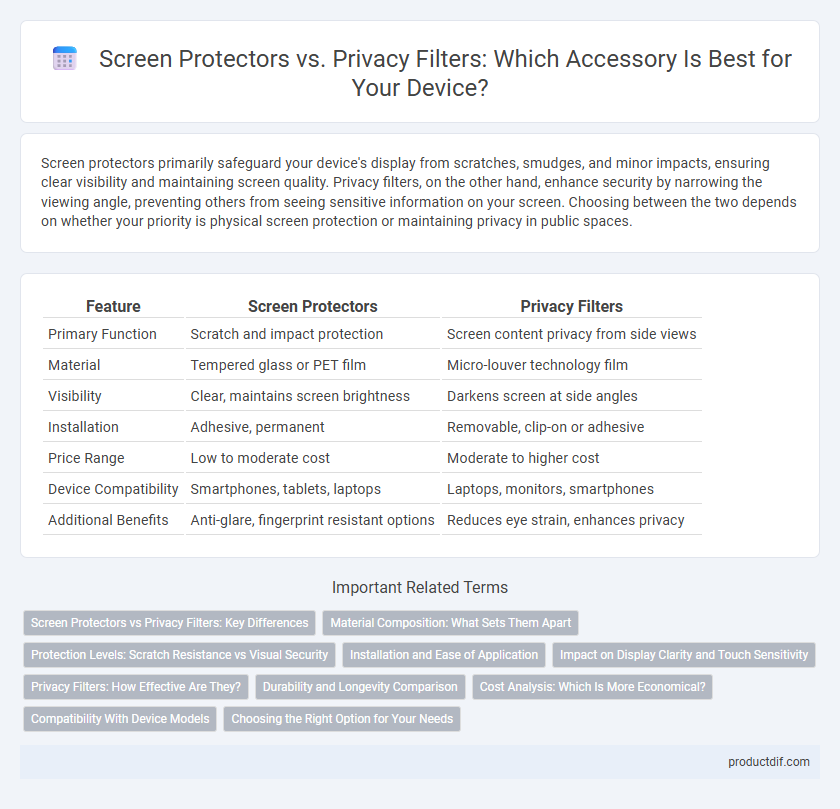Screen protectors primarily safeguard your device's display from scratches, smudges, and minor impacts, ensuring clear visibility and maintaining screen quality. Privacy filters, on the other hand, enhance security by narrowing the viewing angle, preventing others from seeing sensitive information on your screen. Choosing between the two depends on whether your priority is physical screen protection or maintaining privacy in public spaces.
Table of Comparison
| Feature | Screen Protectors | Privacy Filters |
|---|---|---|
| Primary Function | Scratch and impact protection | Screen content privacy from side views |
| Material | Tempered glass or PET film | Micro-louver technology film |
| Visibility | Clear, maintains screen brightness | Darkens screen at side angles |
| Installation | Adhesive, permanent | Removable, clip-on or adhesive |
| Price Range | Low to moderate cost | Moderate to higher cost |
| Device Compatibility | Smartphones, tablets, laptops | Laptops, monitors, smartphones |
| Additional Benefits | Anti-glare, fingerprint resistant options | Reduces eye strain, enhances privacy |
Screen Protectors vs Privacy Filters: Key Differences
Screen protectors safeguard smartphone and tablet displays from scratches, cracks, and smudges by adding a transparent protective layer. Privacy filters, meanwhile, utilize micro-louver technology to restrict the viewing angle, preventing onlookers from seeing the screen content and enhancing data confidentiality. Choosing between a screen protector and a privacy filter depends on whether physical screen damage prevention or visual privacy is the primary concern.
Material Composition: What Sets Them Apart
Screen protectors typically use tempered glass or PET film designed to prevent scratches and reduce glare, while privacy filters incorporate micro-louver technology embedded within a layer to restrict viewing angles and protect screen content from prying eyes. The tempered glass in screen protectors offers high transparency and touch sensitivity, whereas privacy filters employ a specialized polymer layer that diffuses light horizontally to ensure screen information remains visible only to the user directly in front of the screen. This fundamental difference in material composition defines their core functionality: screen protectors safeguard physical display integrity, and privacy filters enhance data security through visual obstruction.
Protection Levels: Scratch Resistance vs Visual Security
Screen protectors offer high scratch resistance by using tempered glass or PET materials to shield device screens from daily wear, scratches, and minor impacts. Privacy filters, while providing modest scratch protection, primarily enhance visual security by narrowing viewing angles to prevent onlookers from seeing on-screen content. Choosing between these accessories depends on whether prioritizing surface durability or safeguarding personal information from visual hacking is the primary concern.
Installation and Ease of Application
Screen protectors typically offer straightforward installation with adhesive backing and alignment guides, enabling quick and bubble-free application. Privacy filters, while also applying directly to the screen, often require precise placement to ensure optimal viewing angles and may involve additional steps like attaching frame clips or adhesive strips. Both accessories demand careful cleaning of the device surface before application to maximize adhesion and functionality.
Impact on Display Clarity and Touch Sensitivity
Screen protectors typically maintain high display clarity and often enhance touch sensitivity by providing a smooth surface, whereas privacy filters can reduce brightness and sharpness due to their micro-louver technology, slightly diminishing visual quality. Privacy filters also may introduce a subtle graininess on the screen that affects the overall viewing experience, while screen protectors usually avoid this issue. Touch responsiveness remains largely unaffected by screen protectors but can experience mild interference with privacy filters depending on their thickness and material.
Privacy Filters: How Effective Are They?
Privacy filters are highly effective in safeguarding screen content from prying eyes by limiting the viewing angle, ensuring only the user directly in front of the screen can see clearly. These filters utilize micro-louver technology to darken side views, dramatically reducing information theft risks in public or shared spaces. While not completely foolproof against all angles, privacy filters provide robust protection compared to standard screen protectors that mainly prevent scratches and glare.
Durability and Longevity Comparison
Screen protectors made from tempered glass offer superior durability and scratch resistance, extending device lifespan by preventing screen damage under daily use. Privacy filters, typically composed of thin plastic layers, provide moderate protection but tend to wear out faster due to surface scratches and adhesive degradation. Long-term performance favors tempered glass screen protectors for maintaining screen clarity and structural integrity over months of continuous handling.
Cost Analysis: Which Is More Economical?
Screen protectors generally cost between $5 and $20, making them a budget-friendly option for basic device protection. Privacy filters typically range from $25 to $60, reflecting their added functionality in safeguarding screen content from visual hacking. For users prioritizing affordability, screen protectors offer economical defense against scratches, while privacy filters provide enhanced security at a higher price point.
Compatibility With Device Models
Screen protectors are widely compatible with a broad range of device models, including smartphones, tablets, and laptops, as they primarily focus on scratch resistance and impact protection without altering screen dimensions. Privacy filters require specific sizing tailored to exact device models and screen dimensions to ensure effective privacy and optimal viewing angles, making compatibility more restrictive. While screen protectors offer a universal fit, privacy filters demand precise device model matching to maintain both functionality and aesthetic integrity.
Choosing the Right Option for Your Needs
Screen protectors provide essential protection against scratches and smudges, preserving screen clarity and touch sensitivity for smartphones, tablets, and laptops. Privacy filters enhance data security by limiting screen visibility to onlookers, ideal for professionals handling sensitive information in public spaces. Evaluating usage environment and privacy requirements helps determine whether a durable screen guard or a specialized privacy filter best suits your device needs.
Screen protectors vs privacy filters Infographic

 productdif.com
productdif.com